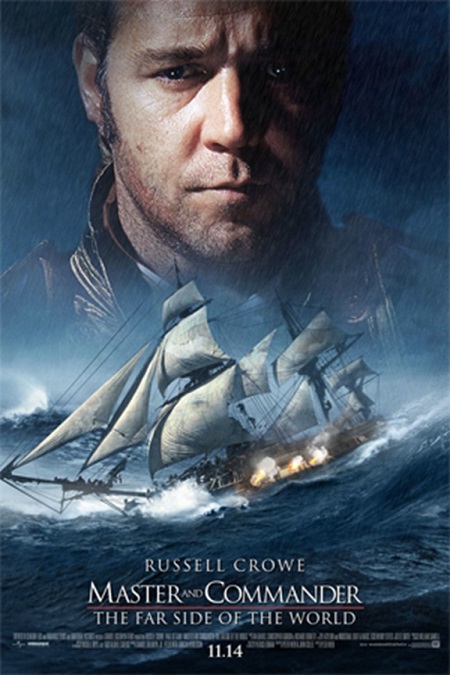
Master and Commander: The Far Side of the World – 2003
This was a movie that I had really been looking forward to seeing. I saw it when it first came out, but didn’t really remember much about it. Before re-watching it, I spoke to friends about it, and everybody would tell me that it was really good, that Russell Crowe was great, and that the depiction of a seafaring vessel in 1805 was incredibly realistic. So I had high expectations, and I was not disappointed.
The movie was based on a popular series of books by English author, Patrick O’Brian, called the Aubrey-Maturin series. There are twenty books in the series with one more that was unfinished, and the movie draws elements from thirteen of them to create its own unique story. Director Peter Weir collaborated with screenwriter John Collee to create an awesome story with plenty of exciting action, great characters, and some captivating drama, making this a wonderfully refined and well-scripted film. And lest I forget, I have to mention the wonderful score, which made good use of baroque and classical pieces like J.S. Bach’s Suite No. 1 in G Major for Unaccompanied Cello, beautifully played by Yo-Yo Ma.
Russell Crowe played the lead, Captain Jack Aubrey. Crowe was fantastic, but what I liked about the character he played was that most movies that take place on ocean vessels, usually create their drama by pitting the crew against an unlikable captain. But Aubrey was just the opposite. He was the perfect captain. He was smart, tough, compassionate, and truly cared about the men under his command. He was a great leader and his crew trusted him so completely that they were ready to follow his every order without question. And I loved the clever deceptions he used to either evade or attack his foe.
By that description, you might think of him as a character that unnaturally saintly, too good to be realistic. But to be sure, he had his flaws, bringing him down to earth and showing us that he was just as human as anyone. Nowhere is this more evident than the main plot of the film, which takes place during the Napoleonic wars. Aubrey receives orders to hunt down the French privateer vessel, the Acheron. He is to either burn it, sink it, or take it as a prize. But right at the beginning of the film, the Acheron surprises Aubrey and severely damages his ship, the HMS Surprise. He barely escapes by fleeing into a fog bank. Logic dictated that he return home or at least find a port in which to make repairs. But he, almost like Captain Ahab in search of his whale, becomes dangerously obsessive in completing his mission, even going so far as to exceed the boundaries of the mission, pressing on, putting his ship and crew at risk.
The ship’s surgeon, Dr. Stephen Maturin, played by Paul Bettany, seems to be the voice of reason, urging Aubrey to turn back, to return to England before they are all killed by the Acheron, a massive, hulking ship that completely outmatches them. But Aubrey’s obsession is too great to be denied. Despite surviving the Acheron’s initial attack, a sea storm that nearly sinks them, a dead calm that leaves them motionless for days, and a restless crew, his pursuit continues.
The film explores Aubrey’s obsessive pursuit of his prey. But it also paints a wonderful picture of what life on a sea vessel in the early 1800s must have been like. The exciting battle sequences were amazingly realistic, and the movie actually won two Oscars, one for Cinematography, and the other for Sound Editing. It was nominated for a total of ten Awards, but it was up against the juggernaut, The Lord of the Rings: Return of the King. I mean, Master and Commander was an incredibly good movie, but let’s be honest. It never stood a chance.
Now, of course, there were plenty of other interesting characters played by competent actors. In fact, this film has the distinction of being one of only 120 films made since 1934 that have an entirely male cast. James D’Arcy played First Lieutenant Thomas Pullings, who was given command of the Acheron after it was finally captured. Son of famous Actress Maggie Smith, Chris Larkin played Captain Howard of the Royal Marines, the one who accidentally shot Dr. Maturin, an event which indirectly led to Aubrey’s victory over the Acheron.
Billy Boyd, the actor famous for playing Pippin in the Lord of the Rings films, played Barrett Bonden, the HMS Surprise’s Coxswain, the man controlling the vessel’s rudder with the big wheel. Max Perkis, who was thirteen years old during filming, played Lord William Blakeney, the brave young boy who lost an arm during the first attack. Perkis did a fantastic job for such a young actor. Lee Ingleby played Midshipman Hollom, the tragic figure who the superstitious crew labeled a Jonah, and who committed suicide once he started to believe it himself. I also liked Robert Pugh as Ship’s Master, John Allen.
But really, the star of the film was its true standout. Russell Crowe was incredible as Captain Aubrey. Despite his dangerous obsession which nearly got him and his entire crew killed, he was wonderfully likeable. He laughed and joked with his shipmates, giving an air of levity to the perilous mission. He walked among them to keep their spirits up when they were down. He personally comforted the injured. And yet, he dourly administered punishment when discipline was required. And his most redeeming quality, I think, was that he was prepared to give up his chase when his closest friend’s life was in danger. And Crowe played it all perfectly. Well done Russell!

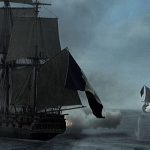
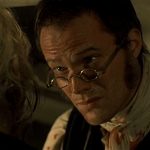

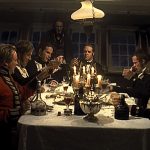


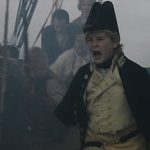
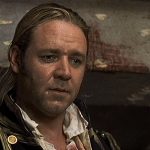
You must always choose the lesser of two Weevils!!!! To pun is to pick a pocket. Remember that sir. I agree with your assessment. I think the dinner scene was a good way to humanize a Captain that until that point had been an aloof, strict, but fair leader to his troops.
I look forward to the sequel, “Captain and Commander: The Far Side of the Galaxy.”